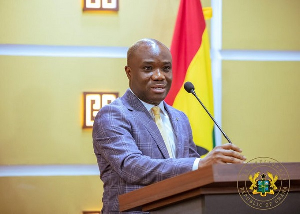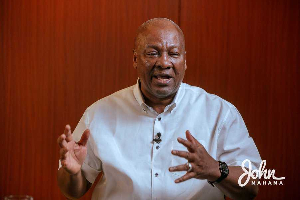The on going debate as to whether the ruling New Patriotic Party should amend its constitution before it goes to congress to elect the flagbearer in December this year or not has attracted various views and concerns. But, in spite of the concerns, the consensus appears to be one of adopting a conservative posture for the next flagbearership contest: "If it ain"t broke don’t fix it.”
In the December Congress, about 2,500 delegates will vote for potentially the next President of the Republic. Yet, critics of the NPP electoral process say the party constitution effectively disenfranchise or deny automatic voting rights to very significant classes of party members.
The President, Vice President, Cabinet Ministers, NPP National Chairman, General Secretary and the seven other national officers, all regional chairpersons and other regional officers of the party, DCEs, and all 128 Members of Parliament on the Majority side are refused automatic voting rights to take part in determining the person best fit to represent the party as its flagbearer in general elections.
The party’s constitution grants 10 voting rights to each one of the nation’s 230 constituencies, with four of the delegates chosen from the Constituency Officers (which does not include the area’s MP) and the majority of six delegates opened to party card-bearing members of the constituency.
Incongruously, it seems, the NPP constitution expressly grants automatic voting rights to all MPs when it comes to electing national executive officers, extending same to all MPs of a region in elections of regional executive officers.
At least one major aspirant, Alan Kyerematen is known to be pushing on high octane for polling station chairpersons to have a greater influence in the selection of the six delegates, a move some believe could further dilute the influence of MPs.
Also, the Office of the Chief of Staff, at the Presidency, is advocating getting DCEs to be delegates, with Kwasi Ankamah, being the main instrument of this push.
But, there is some conservative posture at the top to maintain the status quo, with Asylum Down (the NPP Headquarters) very sensitive about making any moves that could be falsely interpreted as favouring particular candidate(s).
In an interview with The Statesman, NPP Chairman Peter Mac Manu explained that the party resides in the constituencies, where general elections are held. “So each one of us can still go to our various constituencies and be subjected to the laid down process if we desire to be delegates.”
He is not for change in this matter. He does not see a problem with the current arrangement, a view shared by O B Amoah of the Legal & Constitutional Committee. “The argument is coming up because some are saying that it is more difficult to influence a minister or an MP monetarily than an ordinary constituency person. But at the same time, so long as the Minister or MP or national executive officer is a member of a constituency and he gets elected, it means you can’t also influence him at that level,” Mr Amoah argues.
General Secretary Nana Ohene Ntow and 3rd Vice Chairperson Abdul Rahman Musa have, nevertheless, both expressed their reservations with the party’s electoral process, which Ohene Ntow believes effectively disenfranchises both National and Regional Officers. But, he also appears very uneasy about calls for any constitutional amendment at this stage.
“We are reduced to being supervisors of party election,” Alhaji Musa lamented. Essentially, critics point to the fact that the Presidency, MPs, National and Regional Officers have arguably closer proximity to the centre of power and institutionally better placed to know the characters vying to lead the party and which of the candidates best represent the attributes required of the highest position of the land. Yet, even those critics think the timing may not be appropriate for any amendment, with nominations expected to officially open in five months times.
Peter Ala Adjetey, the veteran lawyer who chairs the Legal & Constitutional Committee of the NPP, in a recent interview with The Statesman shared this conundrum, believing a constitutional amendment in that regard would be desirable but the timing certainly undesirable.
In any event, MPs usually have enough influence to ensure their selection as delegates. But, according to the man, who was also once the party’s National Chairman, the NPP constitution must be obeyed to the letter until the amendment is done describing the provision as “funny.”
This could mean, per the constitution, “Every constituency executive committee shall convene an extraordirnary constituency delegates conference to elect, when required, six (6) members of the constituency who are not constituency officers, together with four (4) constituency officers…”
Mr Ala Adjetey, who is also a former Speaker of Parliament, believes any amendment to expand the electoral college ought to have been carried out a long time ago adding, “I don’t know whether we can do it now because you need an annual delegates conference to do the amendment.”
“And I don’t see how we can call an annual delegates conference before calling the National Congress to elect the presidential candidate,” he opined. The two party gatherings are expected to be merged and held together. The constitution, however, allows an Emergency National Delegates Conference to be convened “Whenever the National Executive Committee or the National Chairperson thinks it necessary…”
Obiri Boahen, Brong Ahafo Regional NPP Chairman in a separate interview with The Statesman insists the situation demands constitutional amendment.
“We should not behave that the NPP constitution is untouchable.”
The renowned lawyer describes the criterion for the selection of the ten delegates as “unfair” and at the same time not clearly spelt out in the party’s constitution.
He cited the case of Ameyaw Akumfi,a Cabinet Minister, who is not an MP, but has contributed immensely to the party and probably knows most of the aspirants more intimately than many may still not be selected as a delegate..
Also expressing his view to The Statesman, Alhaji Yusif Ahmed ,the Greater Accra Regional Youth Organiser of the NPP added his voice to the call for an amendment. According to him, it is the regional executives who run the constituencies together with the constituency executives, while the national executives see to the administration of the party, so to leave both groups out is discriminatory and illogical, especially since, in his view, “the national and regional executives know who is for the position,” of presidential candidate.
He, also, shares the un-timeliness view that the amendment should not happen before the election of the next flagbearer in December this year.
“From the look of things, I don’t think it is now feasible looking at the situation. This is because if we make any last minute changes, it will look as though we have some candidates in mind. This should have been done long time ago,” he further stressed.
OB Amoah: NPP constitution is just fine
There are others who share the view of Peter Mac Mau and maintain that the constitutional provision is a sensible one, however.O B Amoah is the longest serving member of the Legal and Constitutional Committee of the NPP, appointed in 1998, as well as the Deputy Minister of Education, Science and Sports.
In an interview with The Statesman last Thursday, he said that the exclusion of MPs from the delegates conference was not an oversight, but a deliberate decision on the part of the constitution writers, and on which ought not to be changed.
"Some have argued that there is a flaw in this article of the constitution, which says that certain key members of the party should have been catered for specifically when it comes to the electorate," he said.
"Others too have argued that we have operated the system since "92, and we can still operate it without making special provisions for MPs."
"As a member of the Legal Committee, I see merits in both arguments, but I believe the intention of the framers of the constitution was that the emphasis should be on the grass roots and constituency level.
"If you are a key member of the party then you obviously belong to a constituency; and if you are that 'key’ then your constituency should obviously nominate you as a delegate towards choosing the President."
A specific parliamentary group, voting independently of the constituencies, could even take the voting power out of the hands of the local party members and give undue weight to the MPs’ vote, he warned.
"The danger is that if you set up blocks, then more or less a block can decide who should lead the party, especially the parliamentarians."
He pointed to the Parliamentary Group created under Article 13 of the party’s constitution, which plays various roles including the election of the leader, deputy leader, chief whip and deputy chief whip, in consultation with the President when the party is in office.
"But when it comes to the election of the flagbearer, the parliamentary group is not recognised, and that is where the debate is. If you are an MP, minister of state or a national officer, then you should seek to be nominated as a delegate to represent your constituency."
Although theoretically, a Member of Parliament or national executive member might fail to gain election, Mr Amoah is not aware of any such case.
To those who are calling for change, Mr Amoah says: "It will take some convincing… If you are an MP and your constituency will not regard you as crucial enough to be one of the delegates, then you have a problem. Me as a minister, I should be able to convince my constituency that I should be made one of the delegates.
"With this same group [of MPs, national officers, etc] dissolved into the constituencies, it becomes almost the same thing [as if there was a constitutional provision for their inclusion]."
He was not dismissive of the calls for amendment, however, saying that they should be taken seriously.
"For me, this issue is more pertinent than the issue of ministers resigning. This is a question of the electorate, mandated to elect the flagbearer of the party. They are deciding for us who the candidate will be - and probably the next president."
He suggested that the party should look at the constitution of other parties in other jurisdictions, such the UK’s Labour and Conservative party.
"There is a parliamentary group which is represented at the party level and which is supposed to elect the leader, deputy leader, chief whip and deputy chief whip in consultation with the President when we are in office.
Meanwhile, some members of the public have expressed mixed reactions to the NPP constitutional amendment issue when The Statesman went to the streets to solicit their views.
Some say the current situation is good and should be maintained. They explained that, given the voting rights to the "top men" of the party will put them at a position where they will have only their "favorites" and associates to lead the party. As such, only the grassroots men should be given the chance to determine who should lead the party since they know what is happening on the ground.
Those in support of the amendment hold that it is not fair for the top members of the party to be exempted from voting because it is against their constitutional rights. According to them, they are rather in the best position to elect the right people to lead the party.
















